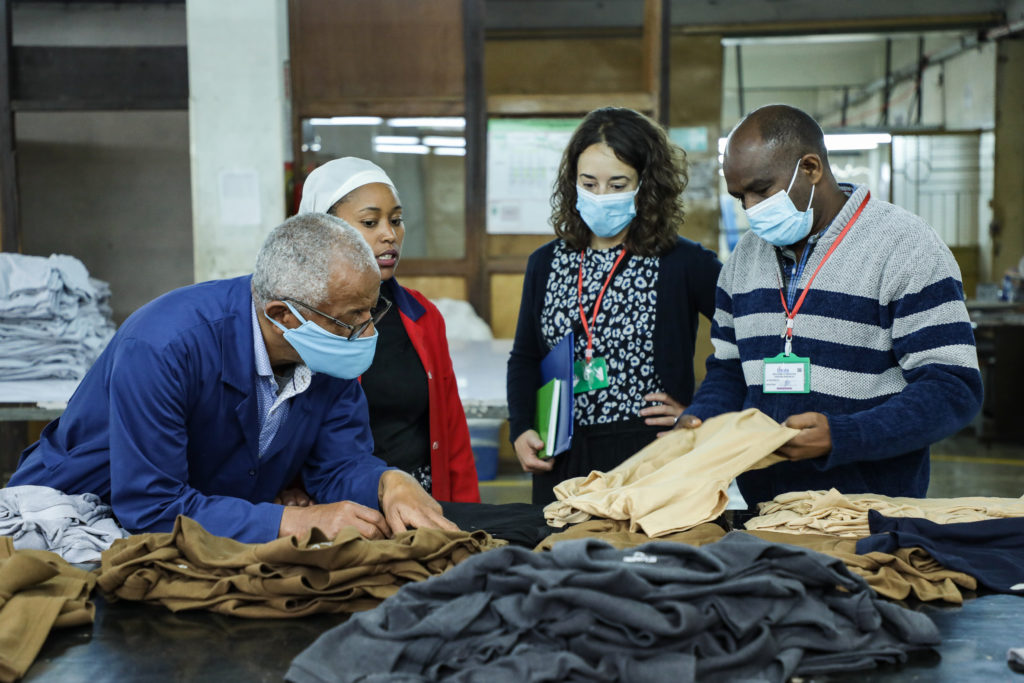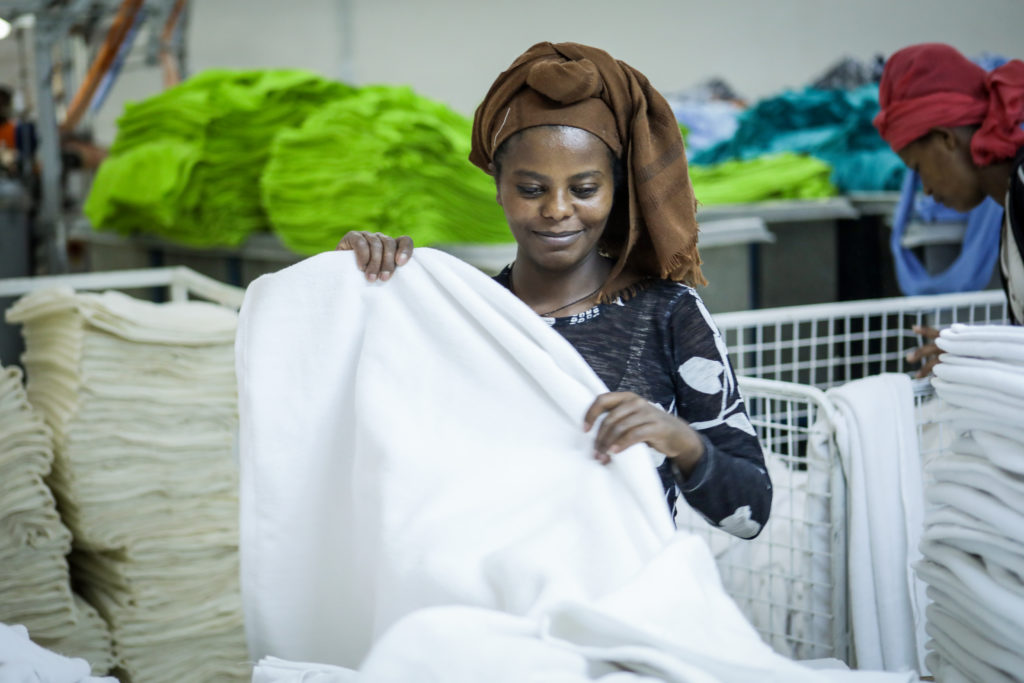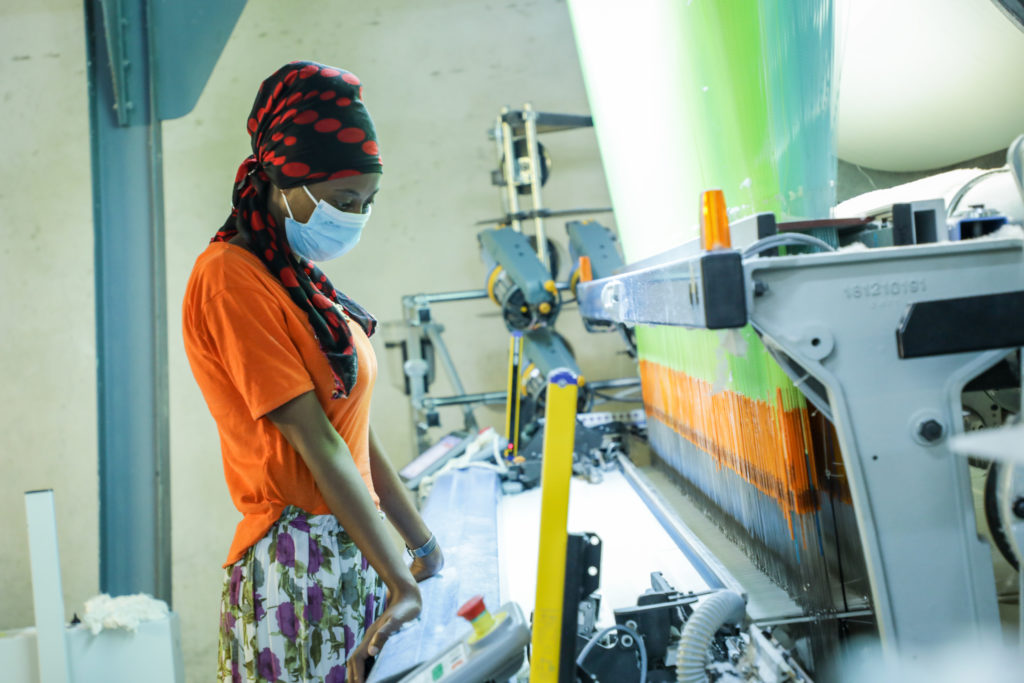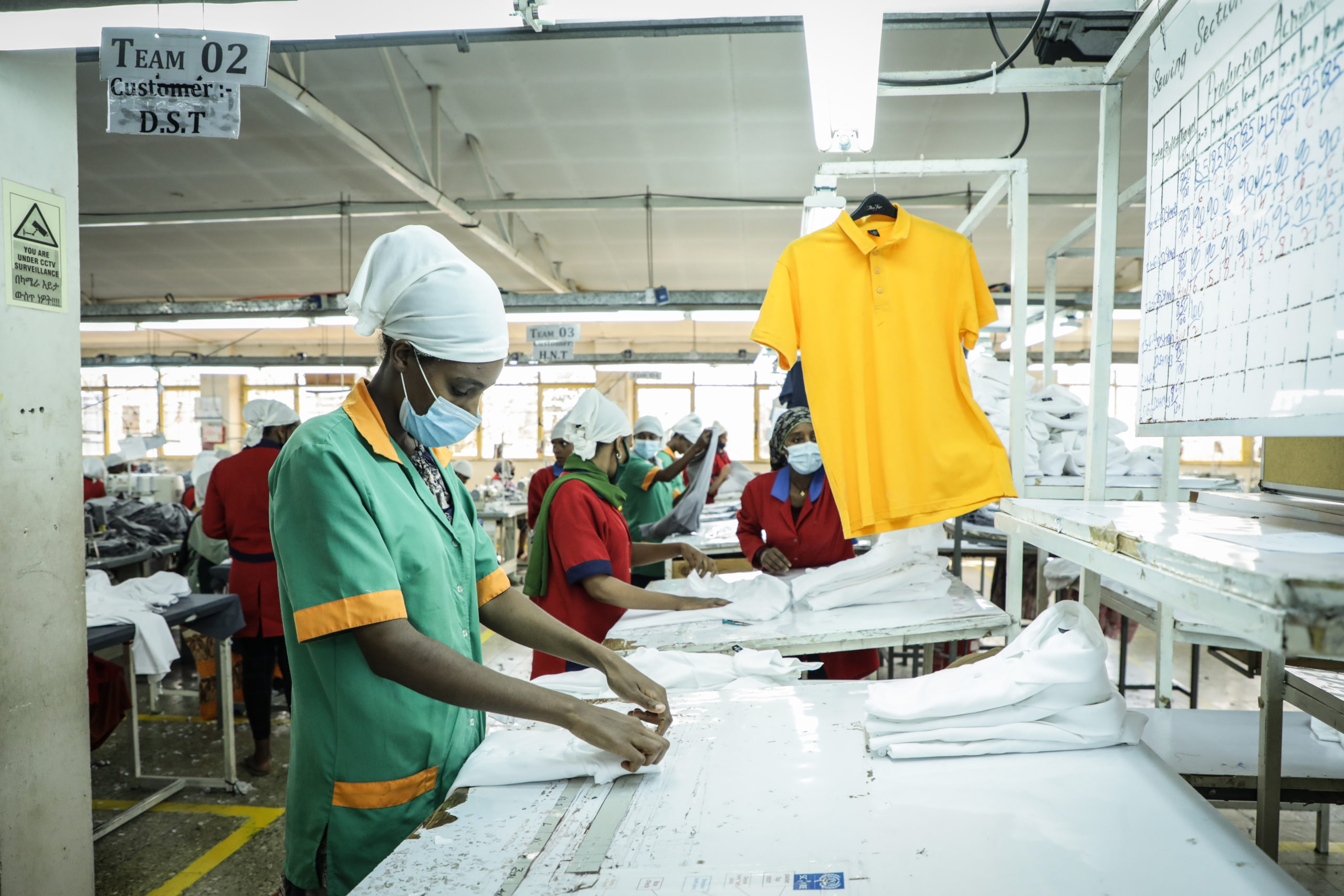Solidaridad, in partnership with CSR Netherlands (MVO Nederland) and Etisk Handel Danmark (formerly Danish Ethical Trading Initiative), and funded by the European Union, have been working together to stimulate environmentally responsible production that delivers better livelihoods for farmers and workers.
Bottom Up! also works to build market linkages by connecting European buyers and Ethiopian factories, demonstrating the value of better production practices for both parties. It simultaneously aims to raise awareness among European consumers around the challenges in the textile sector.
Another of the programme’s aims is to rebalance elements of gender inequality present throughout Ethiopia’s textile sector. Though women make up the majority of garment workers in the country, few are in management roles. By supporting the introduction of women’s committees and daycare centres within factories, for example, Bottom Up! provides opportunities for the textile industry to address gender inequality.
Adapting to meet external challenges
Early on during the development of the project, Bottom Up! encountered numerous external challenges that altered its path:
- The COVID-19 pandemic, floods and ongoing conflict in Ethiopia dramatically affected seed multiplication, harvesting, and farmers’ processing capacity. Nevertheless, Solidaridad managed to maintain the seed supply and supported communities in recovering from the devastating impacts of these events.
- The situation made it impossible to conduct a Cotton made in Africa (CmiA) certification, as international auditors were unable to travel to Ethiopia. At the same time, there was limited demand for this certification among local stakeholders, in particular among the ginneries. Solidaridad concluded that cotton farmers in Ethiopia had limited incentives to gain certification.
- The project was meant to provide training and capacity building to smallholder cotton farmers. Given the impact of external events, the focus shifted towards strengthening the training activities on good agricultural practices, which would have a direct impact on farmers’ ability to implement sustainable farming practices.
- External factors also hampered efforts to improve the position of workers, in particular women. Where possible, trainings were adapted to the COVID-19 situation, and Solidaridad located alternative factories in safer regions where project implementation was possible. Solidaridad Ethiopia also provided training to employees and factory managers on gender and soft skills, women empowerment and leadership.

In spite of its rocky beginnings, Bottom Up! has plenty to be proud of. Below we share details about some of the programme’s achievements over the past four years.
Training on gender and soft skills
A visitor to any Ethiopian garment factory will notice the large number of women at work. Women make up over 80% of textile workers, while men are in the clear majority at the management level. It remains difficult for women to reach management and decision-making levels in the sector. Finding a solution to this persistent issue is critical for creating a sustainable textiles sector, and a key aim for the Bottom Up! programme.
Despite the challenges, there are a number of women who are paving the way towards gender equality. Such as Zebenay Birhanu, a laboratory officer at ETUR factory, who took part in the gender and soft skills, women empowerment and leadership training:
“After working for a year in a cleaning position, I was promoted to work as a mechanic, which is a comparatively better position. I have taken different training opportunities offered by Solidaridad Ethiopia in the Bottom Up! project. The training schemes have really benefited me to look at my inner potential and to grasp opportunities.”
The gender and soft skills programme has enabled me to know my rights and responsibilities as a woman and to collectively voice the needs and priorities of women workers inside the factory.
Zebenay Birhanu, Laboratory Officer, ETUR Factory
“My confidence has gradually increased as I learned how to tackle work-related challenges, including sexual harassment. The gender and soft skills programme has enabled me to know my rights and responsibilities as a woman and to collectively voice the needs and priorities of women workers inside the factory. I aspire to be a production manager in the next three years.”

Mekiya Hussien, Maintenance Head at the Desta Garment factory and chairperson of the labor union, also participated in the gender leadership training. She says: “Being a woman and a chairperson of the labor union was not always welcomed by factory workers and managers initially. However, gradually, I have proven myself to both managers and workers that I am capable of leading the union.
I am one of very few women committee members representing workers’ federation at national level. I have initiated and organized a women’s committee inside the factory so that we can collectively voice our needs and priorities, and address gender-related norms inside the factory.
Mekiya Hussien, Maintenance Head, Desta Garment Factory and Chairperson of the labor union
“I am one of very few women committee members representing workers’ federation at national level. I have initiated and organized a women’s committee inside the factory so that we can collectively voice our needs and priorities, and address gender-related norms inside the factory. We have developed a sense of sisterhood and we technically and psychologically support each other.”
Zebenay and Mekiya are just two of the 2,753 women factory workers who have received training through the Bottom Up! programme to date. Training topics include:
- Transformational and basic leadership skills
- Leadership skills for trade unions members and management team
- Conflict management
- Occupational health and safety.
Working on gender equality with Ethiopia’s Ministry of Industry
In partnership with Ethiopia’s Ministry of Industry, GIZ and UNIDO, Solidaridad helped to develop a set of ambitious gender mainstreaming guidelines that will be used throughout the country’s textile industry. The guidelines address gender-related issues specific to the sector including unequal access to resources and more skilled, higher-earning positions, and a gender-based pay gap. They’ll also allow professionals to measure, monitor and evaluate the industry’s performance in this field, as well as:
- contributing to gender-related recommendations, policies and legal framework improvements
- acting as a reference for further gender-related research; and
- providing source material for capacity building training, consultative and mobilization forums, and advocacy work.
Mr Dagi, a representative from the Ministry of Industry’s Gender Department said: “Solidaridad’s contribution is very important for the development of this gender guideline manual, particularly their financial support and technical knowledge”.
We expect the guidelines to be useful not only for the Ministry of Industry, but also for other government institutes, factory employers, workers’ federations, policy makers, gender experts, civil society organizations, buyers and brands, among others.

Training on more environmentally friendly practices
Another programme priority is the promotion of clean and environmentally-friendly production practices. The textile industry has a big impact on the environment and people’s health due to its abundant use of chemicals, water and energy.
“From the use of LED lamps to an internal purchasing ban on harmful chemicals, a garment factory can do a lot to produce in a cleaner way,” said Kalayu Gebru, project manager in Ethiopia for Bottom Up! and an expert on sustainable garment production.
From the use of LED lamps to an internal purchasing ban on harmful chemicals, a garment factory can do a lot to produce in a cleaner way.
Kalayu Gebru, BOTTOM UP! Project Manager, Solidaridad ETHIOPIA
“We have noticed that there is a great lack of knowledge among factory managers about sustainability. That’s why we provide training courses. The first module deals with local and international environmental regulations. Other modules deal with water use and waste separation, for example.’’
Kalayu’s training sessions are a valuable initiative for promoting sustainable practices among garment factory managers, and have been met with enthusiasm.
Showcasing Ethiopian textiles in Europe
By helping Ethiopian producers achieve and maintain sustainable production practices, Bottom Up! aims to encourage European companies to invest in the sector and buy more sustainably.
With this goal in mind, in early 2023 representatives from the Desta and Nasa textile factories joined Solidaridad at Texworld, one of Europe’s biggest fashion trade fairs in Paris. We wanted to offer our partner factories the chance to showcase their high quality, sustainable textiles to professional buyers from all over the world.
Raghav Pattarm, CEO of NASA Garment, was at the event to represent his company. He said: “The trade fair is not only helpful for finding buyers, but also for getting to know suppliers. And to see how fashion is evolving. You can see: What trends are there right now? What kind of fabric is made? Which raw materials are used? The trade fair gives us knowledge that we can use to prepare for future trends in good time.”
We want to be known as a company that’s organic and sustainable. Europe is crazy about organic – if we want to enter the European market we have to evolve.
Eyob Bekele, Managing Director of Desta Garment
Eyob Bekele, Managing Director of Desta Garment, was also present. He said: “The [Bottom Up!] project has had a long-term impact on the organization and the way people think in our company. We’d like to become even more sustainable and obtain certifications such as Ökotex Made in Green, FSC and GOTS. We want to be known as a company that’s organic and sustainable. Europe is crazy about organic – if we want to enter the European market we have to evolve.”
For more information, visit the Bottom Up! page and contact project lead, Laura Miguel at laura.miguel@solidaridadnetwork.org with any questions.
Read more about Solidaridad’s programmes in cotton and textiles.
Bottom Up! is financed by the European Union and co-financed by the Netherlands Ministry of Foreign Affairs.

